
Old Boy Lachlan Stuart (2004-08) has returned to TGS for a special Year 12 Assembly, motivating our Year 12 students before their G150 Gift Run.
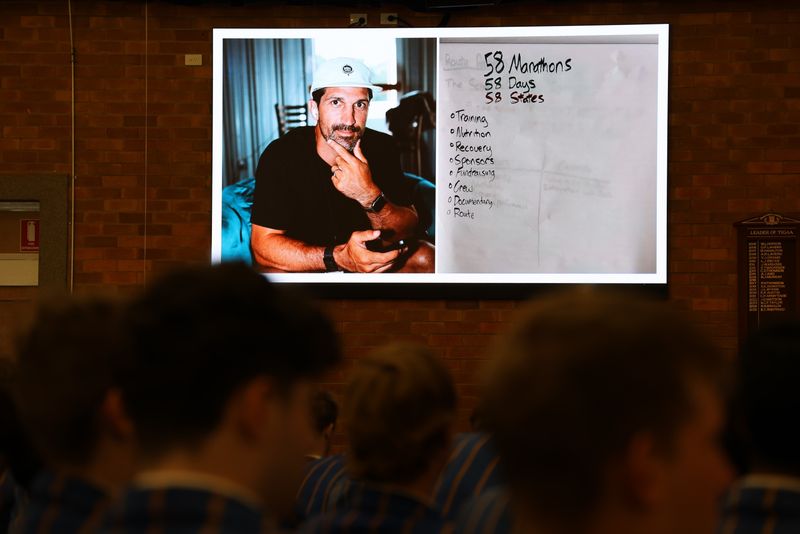
Mr Stuart will return to TGS again for the event held on Wednesday, 28 May to support the Year 12's significant fundraising G150 Gift Run event.
The boys are running 1500km in a relay format to honour a 1968 TGS Interact Club fundraising project that will help upgrade the original School gates on Herries Street, along with raising funds for the Nerve Connection Foundation.
Lachalan Stuart shot to international fame for his inspiring 58-2-58 project earlier this year. He ran a marathon in 58 different states of the USA and Australia in 58 days, raising funds and awareness for mental health. He is proud to be supporting this TGS marathon relay and shares his motivation here:
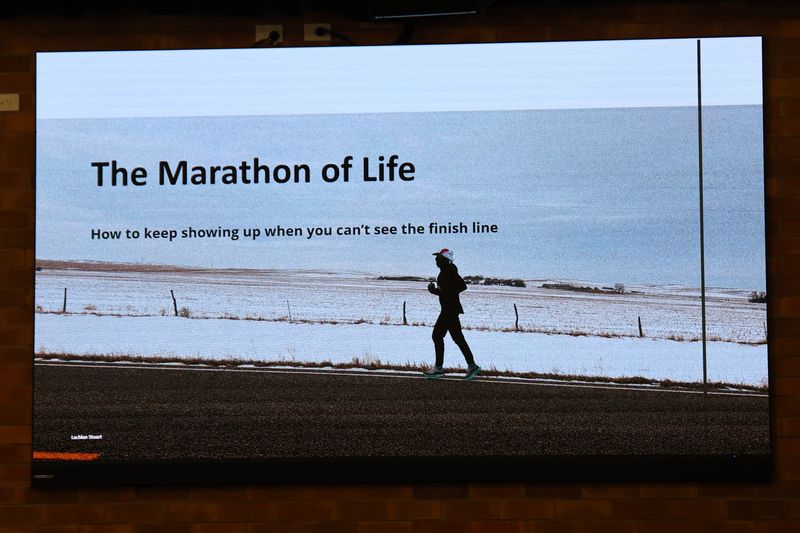
How did you recover after the 58-2-58 marathon? My coach had me running two hours a day for the first week after I finished and then tapering down from there. It was frustrating because I was ready to stop, but at the same time, it was good for my head to keep moving a little bit and reflect on everything I’d just done.
How did you deal with so much travel while running such huge distances every day? I had a great team. Obviously, waking up in a different place every day means you don’t have your usual comforts. We had to find water, figure out a route to run, etc., but that ended up becoming a routine in itself. When I hit a rough patch mentally or was injured, the team stepped up and made sure I kept moving so we could stay on track. It was definitely challenging, especially looking outside when it’s snowing and minus 20 degrees, the last thing you want to do is run. But we got it done.
How did you stay motivated through fatigue, injury and other challenges? The goal meant everything. I had personal reasons - just wanting to see what I was truly capable of. I’ve always pushed myself in sport and when I tied that to a bigger purpose - raising awareness for mental health - it gave me another level of drive. When I was struggling, I’d think about the people watching my story, the messages I was getting. I couldn’t quit knowing that others were looking to me for inspiration. That helped me keep going, especially when things got really tough.
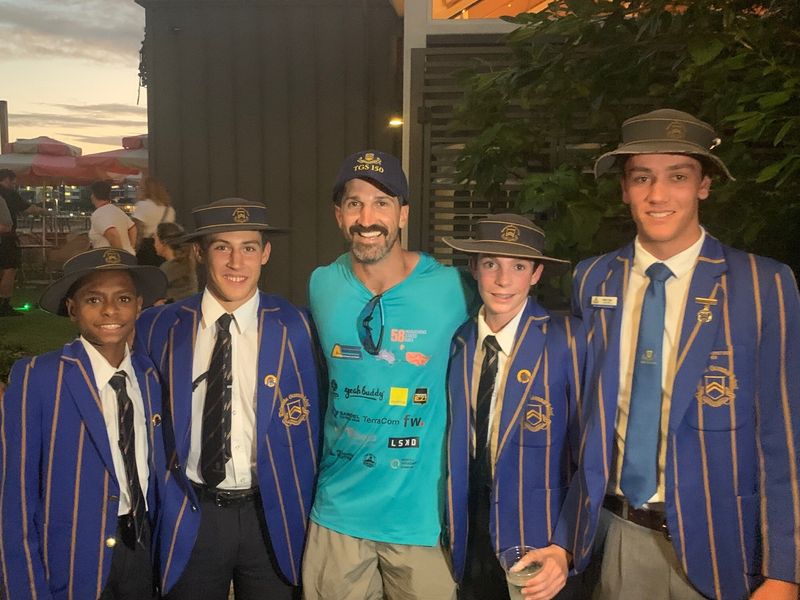
What was the highlight of the journey? Seeing my wife when I crossed the finish line, that was a breath of fresh air after nearly three months living with my mates. But honestly, even living with them was a highlight. Being on an adventure like that together, sharing those experiences, it's something most people will never get to do. No one can take that away, and just thinking about it makes me smile.
Do you realise how much of an inspiration you’ve been to others? I don’t think I fully do. One of the most humbling moments was receiving a message from Toowoomba Grammar School. I’m proud to be a TGS Old Boy, and to know I’ve had an impact on the staff and students, it meant the world. Back when I was at School, I always wanted to be successful, but I didn’t know what that would look like. So, to have some small impact on the boys there now, that brought tears to my eyes. Seeing some of the current students and Mr Kefford at the finish line cheering me on, that was one of the most special moments. People influence your life long before you realise it. Some of my TGS teachers, Mr John Anderson, Mr Mark Oliphant, Mr Lance Treloar and Mr Matthew Harrison in particular helped shape who I am. Even when I was in trouble. I didn’t get it at the time, but now I’m very grateful for their guidance. Mr Oliphant always wanted me to run cross country and I was so rebellious, I used to say “never!” Definitely a few regrets there. But you live and learn.

What was your favourite place during the run? That’s tough, there were so many beautiful spots. But Greenville, South Carolina stands out. After 32 straight days of sub-zero temps and snow, Greenville was the first day with warmer weather. It was such a welcoming town with a waterfall right in the middle, it felt like an oasis. I think about that place a lot.
What were you thinking about while running? Most of the time I ran without music, so there was a lot of thinking. For me, it became about life. Running gave me space to be who I really wanted to be and to reflect on what success and being a good person looks like to me now - as a husband, a friend. Before, I was always chasing business goals. But this made me stop and really take in the people we were meeting, the places we were seeing and just be present. Some days, I’d be hard on myself mentally, because there was so much time alone with my thoughts. But I wanted that. I wanted to understand myself better.
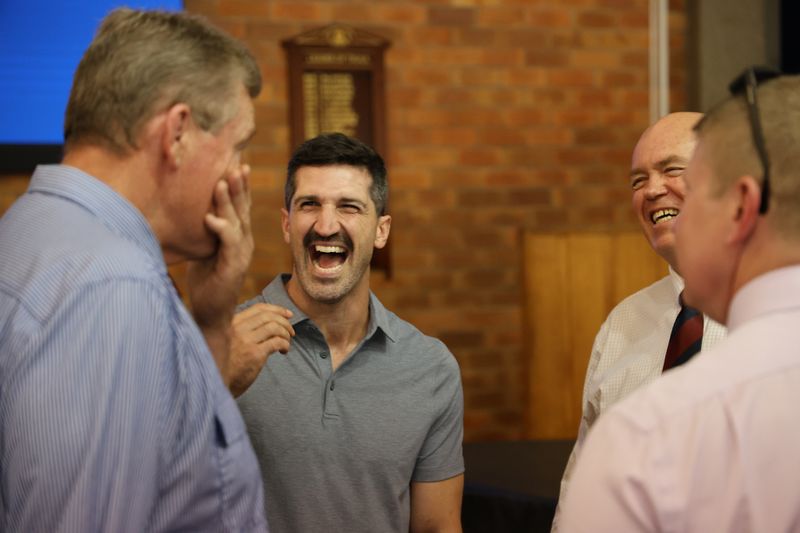
Do you feel like that process helped? Absolutely. I used to put so much pressure on myself to be someone or have certain things. Now I realise the most important things are my family and friends. This experience made me want to spend more time investing in those relationships. I now understand that career and money isn’t what life is all about, whereas before, that was all I thought about. So that was a huge shift.
Did you meet anyone along the way who inspired you? Without a doubt - hundreds of people. Every town we passed through, someone would run with me. It was never about how far they went, it was the effort. I got to hear so many stories about what people had overcome or were still going through, and how my journey inspired them. Focusing on their stories and what they wanted to achieve helped me push through my own pain. It reminded me we should never compare ourselves to others. We’ll never measure up if we do. Just be proud of your own effort.
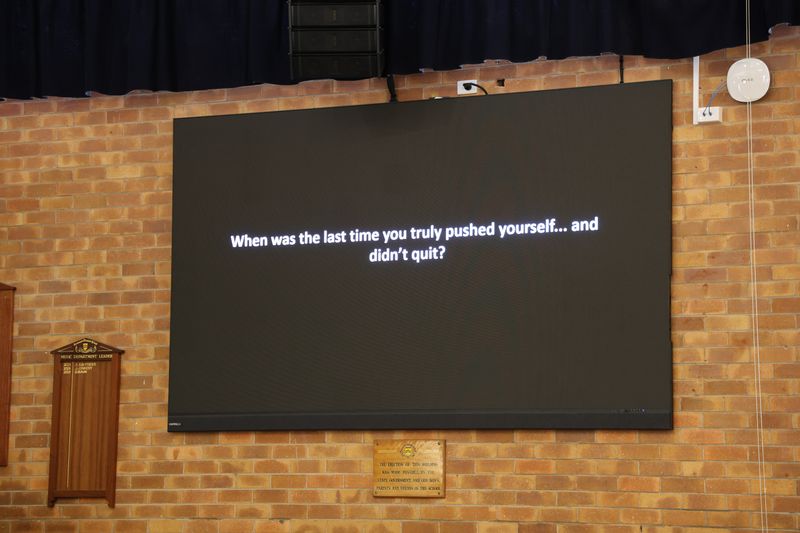
How did you develop that mindset? I’ve always been a decent athlete. After TGS, I played rugby overseas, but I constantly felt like I wasn’t enough. Eventually, I had a fall from grace, I struggled with addiction, mental health issues and suicidal thoughts. Getting through that was when I realised I needed to focus on my journey, not anyone else’s. I’m still not perfect at it, but I try. These days, if I can say “I gave my wife my best today” or “I gave my health my best,” then I can go to bed proud.
What was harder—overcoming addiction or completing this run? Definitely overcoming the addiction. 2013 was rock bottom; I had to look in the mirror and admit I didn’t like the person I saw. That was brutal. I’d hurt people and had to own up to that. But once I started taking responsibility, apologising, rebuilding, then slowly I started to gain confidence. It took about four years to get through that, and then I started The Man That Can Project. The run, as tough as it was, was a much easier place to be because I was proud of myself.
What is The Man That Can Project? It’s a men’s performance and coaching business. We help men figure out what success means to them and support them in becoming the best version of themselves. We run workshops, offer coaching and do a lot of public speaking. You can find out all about it on our website.
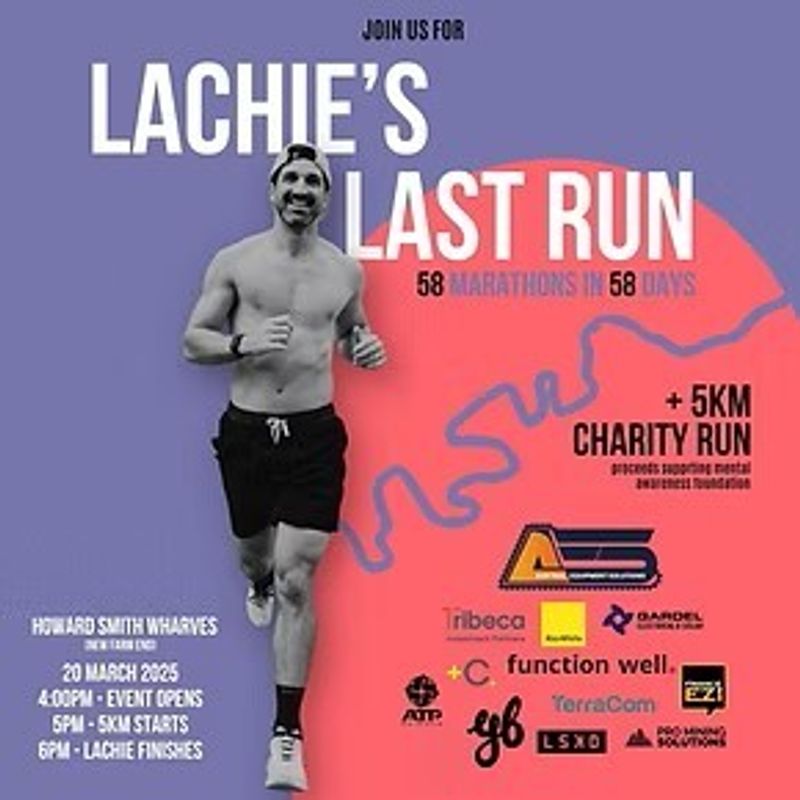
Why did you choose the Mental Health Foundation? I’d already started The Man That Can Project in 2017 when I met the founder of MHF, so I knew what they were all about. I also know where the money goes, and that’s important to me. The work they do has helped people I know personally. That’s why I’ve stayed aligned with them - they make a real impact.
What’s your advice to people who are struggling? It’s normal to go through a season where you don’t feel worthy or valuable. But find one thing you can do to start feeling worthy again. Minimise distractions and focus on that one thing. It’s all about small steps, then progress starts to happen.
What’s next? That’s the big question. First, I’ll spend time with my wife and continue the work I’m doing. There’s still so much more to be done in the mental health space to help people live better lives. As for running, the next big one will be in about twelve months. I’m aiming to beat the record for running across Australia which is currently 39 days.
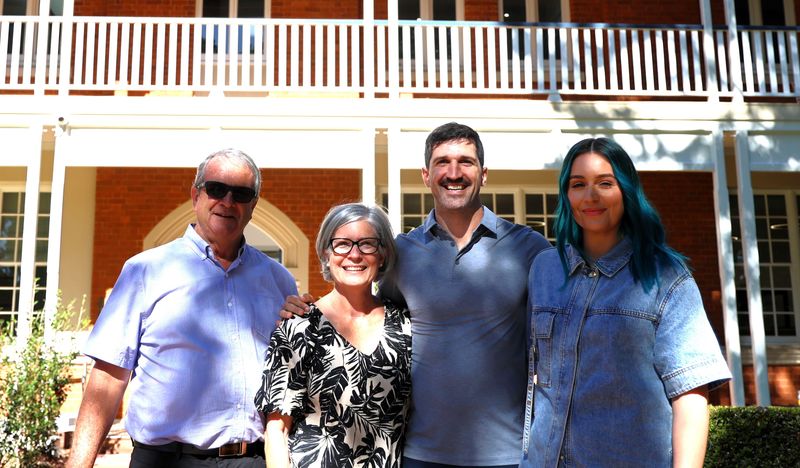
Latest Blog
Nurturing the Seeds of Leadership
Early exposure to leadership roles helps children develop character traits such as responsibility, empathy, resilience and integrity. As a School, we provide the opportunity for the cultivation of leadership skills in our young boys. From the formative years in Prep through to the adolescent years of Year 6, the importance of fostering leadership qualities cannot be overstated. In our modern world, where adaptability, resilience and initiative are regarded as quality attributes, nurturing the…
Pedal Power: The TGS Mountain Bike Club
What started with 12 boys now has 90, with many of the riders racing in the Schools Academy Gravity Enduro Series and other events. We also have a tour of 20 boys going to Thredbo in December this year, where they will tackle some of the most exciting trails in Australia. We thank the wonderful group of parents who support the club. They can often be found driving vehicles up and down the range on a Sunday morning to support the boys. We would not have been as successful as we are without…
Beyond the Blue and Gold
Our focus is to work with each individual student to assist in creating awareness of the world of work, helping students to articulate their interests and identifying what is important to them and their values. We assist the boys in developing the skills to explore the different careers out there. We connect them with employers and industry professionals and help them navigate towards the job or career they are interested in. We work hard to individualise each student’s unique School journey to…
Character and Wellbeing – The Grammar Way
Legacy of Leadership: The Impact of John Mackintosh at Toowoomba Grammar School Toowoomba Grammar School’s first Headmaster, John Mackintosh (1876–1879) led the School with the demeanour of a typical Victorian father figure. His leadership was steadfast and nurturing, with decisions that were definitive and meticulously aimed at creating an environment that was conducive to a boy’s character and learning outcomes. Mackintosh introduced recreational activities such as chess and draughts…
2024 IBSC Conference
It is part of our Strategic Plan's People Pillar which is "build a high-performing culture that supports the wellbeing and development of staff, who exemplify the TGS values and share our commitment to the growth of our boys". In fact, that focus was acknowledged in our receiving The Educator’s 2024 5-Star Employer of Choice award. The Award acknowledges excellence in providing professional development opportunities and nurturing a culture of inclusion and respect. So it was with great pleasure…
Filmmaker, Storyteller and Visionary
From his days as a boarding student at Toowoomba Grammar School, where he first dipped his toes into the world of filming GPS sporting events, to his current roles as sports documentarian and founder of the Outback Film Club, Clancy’s journey is a testament to the power of passion and perseverance. Establishing Outback Film Club has been a real triumph The echoes of school war cries reverberating around the Chandler Aquatic Centre in 2011 marked the start of Clancy’s cinematic journey.…
A Cut Shot Above The Rest
Ben’s sport takes him to the best beaches on the planet, but his love of volleyball began back at Toowoomba Grammar School, inspired after seeing his older brother play. As Ben explains, he was hooked:
Gummingurru Excursion - Deep Time History of Australia on our Doorstep
Gummingurru is unique in being the best-preserved initiation site in southeast Queensland, including bora rings and various stone arrangements that have ancient links to the totems and kinship practices of the Jarowair and Giabal people of Toowoomba and the Darling Downs, as well as the broader region within the highly significant cultural landscape of the Bunya Mountains. The boys were welcomed to, and guided through, the site and its learning centre by Mr Shannon Bauwens, a Western Wakka…
Responding to Negative Peer Interactions
As we approach the end of Term 3, we find it is typically a time when boys start to get tired and emotional and are most likely to make poor decisions that can lead to relationship challenges between peers. Comments and humour shared between mates that may have been received without concern in the first week of the term may change as boys start to tire and their tolerance levels decrease. This may lead to boys reacting with heightened and overly emotional responses. This is normal as boys are…